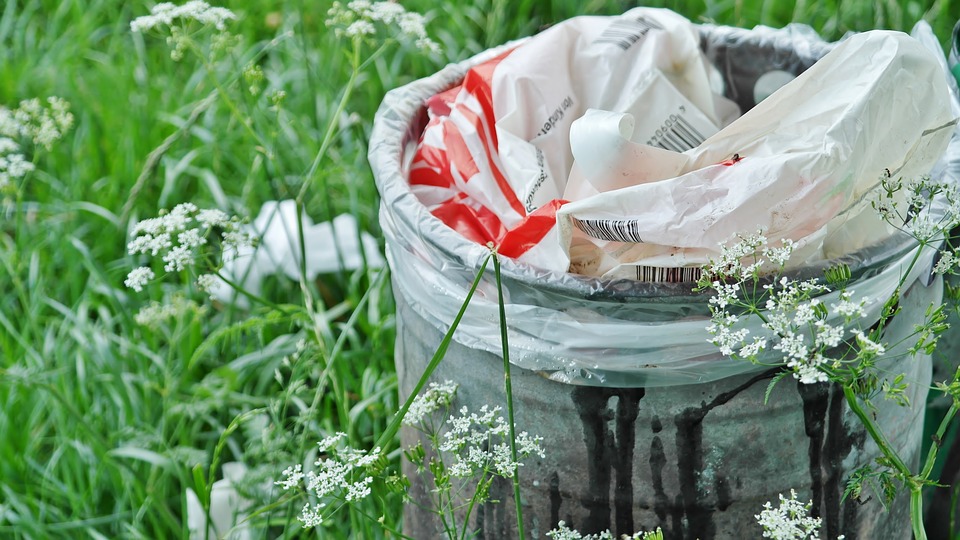Internationale Forderungen nach einem anderem Umgang mit (Plastik-) Abfällen wird immer lauter
The Dutch and Portuguese animal welfare parties have recently submitted proposals to tackle the problems related to the large quantities of waste. Among others, the parties propose to prohibit the use of harmful microplastic ingredients in products, to expand the deposit system and to reduce the use of disposable items in the catering industry. Moreover, the European Commission now seems to want a ban on disposable plastic.

So much plastic is being used that by 2050, there will be more plastic waste in the oceans than fish. Experts at the World Economic Forum Davos already warned about this in 2016. The Dutch Party for the Animals has been arguing for years for an extension of the deposit system to small plastic bottles and cans. Research shows that deposits on cans and small bottles reduce their presence in the environment by 70 to 90%. Therefore, last month, the Party for the Animals also submitted motions to introduce a deposit on plastic bottles and metal cans as soon as possible and to significantly reduce the number of disposable cups.
And the Dutch Party for the Animals is not alone in their fight for a stronger approach to (plastic) waste. Her Portuguese sister party, PAN (Pessoas Animais Natureza, or People Animals Nature), has also submitted three proposals to structurally reduce (plastic) litter. Last week, the party submitted a proposal to introduce a deposit system for cans, glass bottles and plastic bottles. In January, the party successfully presented two other proposals: one to ban all plastic disposable materials (such as plastic plates, cutlery and cups) from the catering industry and one to ban the use of microplastic in products such as cosmetics. Microplastics are very small balls of plastic and because they literally disappear through the drain, they pollute the waters and pose a danger to our water and sea animals.
Meanwhile, the European Commission has also recognized the problem of plastic waste and seems to be taking stricter measures. The Commission’s plan against disposable plastic is presented on May 23rd. The plan is mainly aimed at tackling the use of disposable plastic. According to the European Commission, that kind of plastic accounts for half of all the plastic that ends up in the ocean.
A danger to humans and animals alike
Measures prove to be very necessary as the amount of plastic waste in the world is growing at an alarming rate. Every year, 311 million tons of new plastic are generated worldwide, half of which is for single use only. More than 5 million tons of plastic waste end up in the ocean every year. All waste poses a threat to human and animal health. Every year millions of animals are killed: from fish and birds to turtles and dolphins. The plastic that ends up in the oceans does not degrade completely but disintegrates into smaller and smaller pieces, which also become increasingly more toxic. Animals confuse the plastic pieces for food and get poisoned or suffocated. The gigantic quantities of plastic in the sea have an enormous impact on the health of sea animals and thus on the entire ecosystem.
Die niederländische und die portugiesische Tierpartei haben kürzlich Lösungsvorschläge bzgl. der Probleme im Zusammenhang mit den enormen Abfallmengen vorgelegt. Unter anderem schlagen die Parteien vor, die Verwendung schädlicher Mikroplastik in Produkten zu verbieten, das Pfandsystem zu erweitern und die Verwendung von Einwegartikeln in der Gastronomie zu reduzieren. Die Europäische Kommission scheint nun auch für ein Verbot für Einweg-Plastik zu sein.

Es wird soviel Kunststoff verwendet, dass es bis 2050 mehr Plastikmüll in den Ozeanen geben wird als Fisch. Das World Economic Forum Davos warnte bereits 2016 davor. Die niederländische Partei für die Tiere streitet seit Jahren für eine Ausweitung des Pfandsystems auf kleine Plastikflaschen und Dosen. Untersuchungen zeigen, dass eine Ausweitung auf Dosen und kleine Flaschen, deren Präsenz in der Umwelt um 70 bis 90% reduziert. Letzten Monat hat die Partei für die Tiere deshalb auch Anträge eingereicht, um so bald wie möglich eine Ausweitung auf Plastikflaschen und Metalldosen einzuführen und die Anzahl der Einwegbecher deutlich zu reduzieren.
Und die niederländische Partei für die Tiere ist nicht die einzige, die eine stärkere Herangehensweise an (Plastik-) Abfälle anstrebt. Ihre portugiesische Schwesterpartei PAN (Pessoas Animais Natureza oder People Nature Animals) hat ebenfalls drei Vorschläge zur strukturellen Reduzierung von (Plastik) Abfall eingereicht. Letzte Woche hat die Partei einen Vorschlag zur Einführung eines Pfandsystems für Dosen, Glasflaschen und Plastikflaschen eingereicht. Im Januar reichte die Partei erfolgreich zwei weitere Vorschläge ein: zum einen, dass alle Kunststoff-Einwegmaterialien (wie Plastikplatten, Besteck und Tassen) aus der Gastronomie verbannt werden, und zum anderen, dass die Verwendung von Mikroplastik in Kosmetikaprodukten verbietet. Mikroplastik sind sehr kleine Plastikkugeln und weil sie buchstäblich durch den Abfluss verschwinden, verschmutzen sie das Wasser und stellen eine Gefahr für unser Wasser und das Meer dar.
Gefahr für Mensch und Tier
Massnahmen sind dringend notwendig, da die Menge an Plastikmüll in der Welt in einem alarmierenden Ausmaß wächst. Jedes Jahr werden weltweit 311 Millionen Tonnen neuer Kunststoff hergestellt, von denen die Hälfte nur für den einmaligen Gebrauch bestimmt ist. Mehr als 5 Millionen Tonnen Plastikmüll landen jedes Jahr im Meer. Alle Abfälle stellen eine Gefahr für die Gesundheit von Mensch und Tier dar. Jedes Jahr werden Millionen von Tieren getötet: von Fischen und Vögeln bis hin zu Schildkröten und Delfinen. Der Plastik, der in den Meeren landet, vergeht nicht, sondern zerfällt in immer kleinere Stücke, die auch immer giftiger werden. Tiere sehen die Plastikstücke für Nahrung an und werden vergiftet oder ersticken. Die gigantischen Mengen an Plastik im Meer haben einen enormen Einfluss auf die Gesundheit der Meerestiere und damit auf das gesamte Ökosystem.